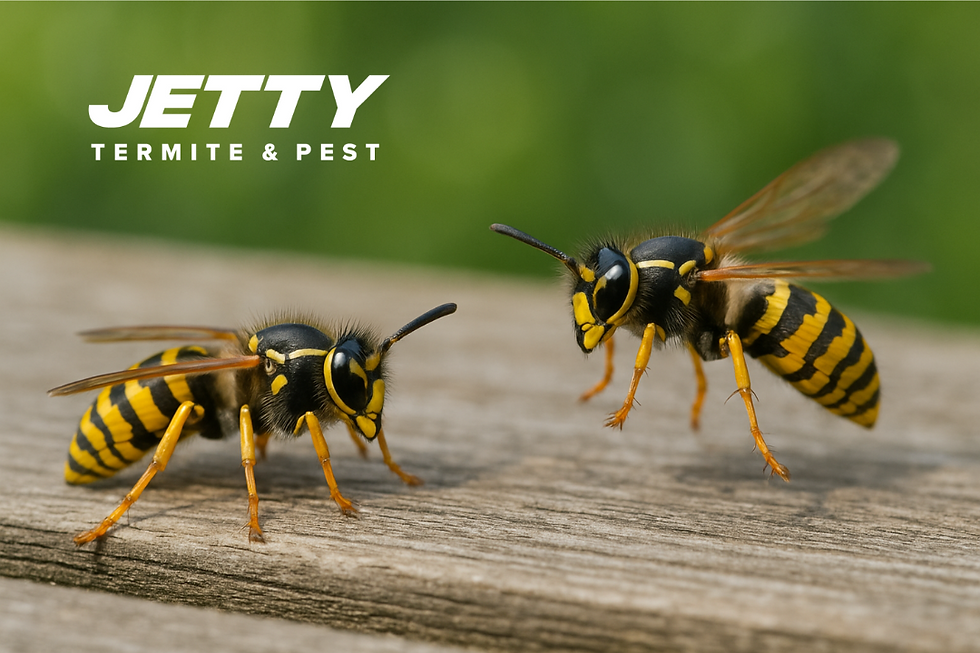Yard and Garden Pest Control: Protecting Your Outdoor Space Naturally
- Jetty Pest

- May 16, 2025
- 3 min read

As spring arrives, gardens and yards across California burst into life with blooming flowers, thriving vegetable patches, and lush greenery. However, warmer weather also signals the return of common outdoor pests that can damage plants and disrupt the enjoyment of your outdoor spaces. At Jetty Termite & Pest Control, we believe in effective, environmentally friendly solutions to manage garden pests while keeping your yard safe for people, pets, and beneficial insects.
Common Springtime Garden Pests in California
Spring’s warmth and moisture create ideal conditions for a variety of pests, including:
Aphids – Small, sap-sucking insects that weaken plants and attract ants.
Whiteflies – Tiny flying insects that cluster on the undersides of leaves and cause yellowing.
Slugs and Snails – These nocturnal pests chew through leaves and flowers, damaging vegetation.
Caterpillars – While some caterpillars become butterflies, others, like cabbage loopers, feast on leafy greens.
Rodents – Mice and rats can damage plant roots and eat garden produce.
Natural Pest Control Strategies
To keep your yard and garden thriving without relying on harmful chemicals, try these natural pest management techniques:
1. Attract Beneficial Insects
Nature provides built-in pest control in the form of beneficial insects like ladybugs, lacewings, and praying mantises. These predators feast on aphids, whiteflies, and caterpillars. To attract them:
Plant nectar-rich flowers such as marigolds, lavender, and sunflowers.
Avoid using broad-spectrum pesticides that kill beneficial insects.
If battling grubs, try introducing beneficial nematodes to the soil. These can be purchased at garden stores and even online retail.
2. Companion Planting
Certain plant combinations help deter pests naturally. Try these effective pairings:
Marigolds repel nematodes and aphids.
Basil keeps mosquitoes and flies away.
Chives and onions deter aphids and Japanese beetles.
Lavender and rosemary repel moths and mosquitoes.
3. Use Natural Barriers and Traps
Creating obstacles for pests can prevent them from invading your garden:
Copper tape around plant beds deters slugs and snails.
Floating row covers protect delicate seedlings from caterpillars.
Sticky traps catch whiteflies and aphids before they spread.
4. Maintain Proper Garden Hygiene
A well-maintained garden reduces hiding spots for pests:
Remove weeds and dead plant debris where pests may nest.
Water plants in the morning to prevent excess moisture buildup, which attracts fungi and insects.
Prune overgrown plants to improve air circulation and deter pests.
5. Introduce Organic Pest Sprays
If pest populations get out of control, consider using safe, homemade solutions:
Neem oil disrupts insect life cycles and is safe for beneficial insects when applied carefully.
Garlic and chili spray repels aphids, caterpillars, and whiteflies.
Diatomaceous earth creates a barrier that dehydrates and kills soft-bodied insects like slugs.
Partner with Jetty Termite & Pest Control for Sustainable Solutions
A pest-free yard doesn’t have to mean harsh chemicals or extensive treatments. At Jetty Termite & Pest Control, we specialize in eco-friendly pest management tailored to California’s unique climate and pest challenges. Our team can help you develop a customized pest prevention plan that keeps your outdoor space beautiful and thriving all season long.
This spring, take control of your garden naturally and enjoy the beauty of your outdoor oasis. Contact Jetty Termite & Pest Control for expert guidance on sustainable pest control solutions!






